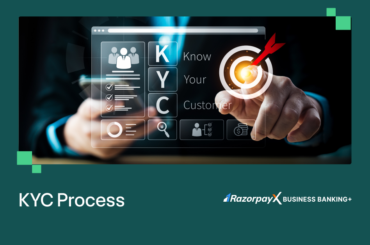Table of Contents
What is a Business Bank Account?
A business bank account is a bank account opened in the name of a company and used only to carry out business-related transactions.
It allows payments to be made or received for that company and isn’t used for personal finances and only used for business transactions.
Business bank accounts are available for different types of businesses, such as sole proprietors, limited companies, partnership firms, etc.
They provide added features like overdraft, multiuser authorization, merchant services, accounting integrations, and more, which are significantly beneficial for business financial management.
Overview of Business Account
A business account on a platform like WhatsApp or Instagram refers to a special account offered by these services, allowing businesses to run advertising campaigns, analyze performance and customize branding.
Both business accounts are important to business function – financial management becomes incredibly challenging without a business bank account, while business accounts on internet platforms are important for digital marketing.
Ideally, a good business account should be a one-stop solution for all these requirements.
Types of Business Account
Business Current Account
A current account is a special kind of bank account intended for businesses to manage their finances better. A current account is primarily used by businesses and organizations for managing their day-to-day financial transactions, including frequent deposits, withdrawals, and payments.
They come with additional features like overdraft protection, international banking capabilities, and online banking platforms tailored to business needs.
Business Payroll Accounts
Businesses use a payroll account to make salary payments to employees. A separate payroll account makes compliance, accounting and tax calculation easier.
Payroll accounts offer automation that helps businesses automatically file taxes and payments for TDS, PF, PT and ESIC. These accounts also allow for integrations with other HRMS to make it a one-stop shop for employee management.
Accounts Payable Account
These accounts help a business manage its accounts payable liability. The vendor management process can get tricky – having a separate account to make payments and check transaction statuses makes the accounts payables process significantly easier.
Some source to pay solutions even offer accounts payable accounts that help businesses manage the entire procurement process, right from sourcing vendors to paying invoices.
Checking Account
A business checking account, unlike a personal one, is specifically designed to handle the financial transactions of a company. It keeps business and personal finances separate, making bookkeeping easier and ensuring legal compliance.
It also gives the business easier access to credit and loans, since the bank providing checking services has a direct understanding of the business’s finances and creditworthiness.
Merchant Account
A merchant account is a special business bank account for accepting electronic payments. Unlike regular business checking, merchant accounts handle credit card, debit card, and other digital transactions.
When a customer swipes their card, the money goes to the merchant account, not the main business account. The provider then transfers the funds (minus fees) after processing. Merchant accounts are most useful for online or digital businesses.
How to Open a Business Bank Account
Here’s how you can open a business bank account in a few simple steps.
- Register your business. You can get it registered as a sole proprietorship, a partnership or a company under the Companies Act. For small businesses just starting out, it is best to apply as a sole proprietorship. For legal or architectural firms with multiple founder partners, a Partnership would be ideal. Registered Companies require extensive documentation, compliance to various taxation and disclosure laws and more.
- Apply for various licenses. Indian laws promote and support entrepreneurship through various schemes and policies. You will need to get your business registered under acts like the GST Act, and get the required licenses.
- Understand your requirement. Banks offer different types of business accounts, depending on the need. These accounts vary in terms of minimum account balance, features offered, credit lines etc.
Read more: Types of Current Account
- Apply online: most banks accept and even prefer online applications. You can go to any bank’s website and apply for a current account or any other business account. KYC documents can also be submitted online. In case the online application doesn’t work, or if you are more comfortable in a non-digital setting, you can also apply through the bank’s physical branch.
Read more: Documents needed for current account opening
- Account processing: Once the officials at the financial institution are satisfied with your documentation, they will open your account. Once your account is functioning, you can also make use of the other services offered by the bank, like credit, forex, etc.
How To Choose the Best Business Account?
A good business account should offer you the following features and services.
Advanced Financial Management
- Seamless Transactions: A good current account should allow for easy deposits, transfers, payments, and bill payments.
- Real-time Insights: Gaining clear visibility into your cash flow through comprehensive dashboards and transaction reports is crucial for informed financial decision-making.
- Integrated Solutions: Seamless integration with popular accounting software and payroll services can significantly simplify your financial management processes.
Security & Control
- Multi-user Access: Assign different levels of access and permissions to team members, ensuring secure control and oversight over finances.
- Advanced Fraud Protection: Real-time fraud detection and alerts help safeguard your accounts against financial risks and unauthorized access.
- Dedicated Customer Support: Timely assistance from a knowledgeable and responsive business banking team is essential for resolving issues and addressing concerns.
Scalability & Growth
- Flexible Financing Options: Access to credit facilities like loans and lines of credit should be tailored to your business’s specific needs and future growth plans.
- Merchant Services: Integrated solutions for accepting payments effortlessly can enhance your customer experience and streamline business operations.
- International Capabilities: Expanding your reach globally necessitates convenient cross-border transactions and foreign exchange services.
Personalized Support & Expertise
- Dedicated Account Manager: Receive personalized support and expert advice from a business banking professional who understands your unique goals and challenges.
- Financial Planning Tools: Leverage resources and tools to forecast cash flow, set budgets, and make informed financial decisions for long-term success.
- Investment Options: Explore various investment opportunities that align with your risk tolerance and long-term financial aspirations.




